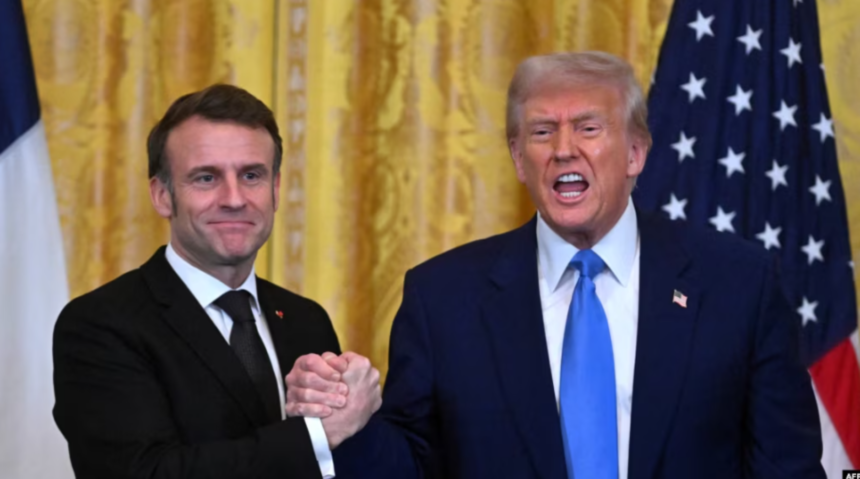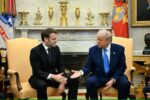U.S. President Donald Trump and French President Emmanuel Macron displayed significant differences on Monday regarding their approaches to Ukraine, highlighting the divide between the United States and Europe on Trump’s proposal for a quick ceasefire agreement with Russia.
During a day of discussions, Presidents Trump and Macron shared a friendly rapport based on years of strong relations. However, President Macron made it clear that he disagreed with Trump on several key issues, as they marked the third anniversary of Russia’s large-scale invasion of Ukraine.
President Trump refused to refer to Russian President Vladimir Putin as a dictator, despite calling Ukrainian President Volodymyr Zelensky a dictator the previous week. President Macron, on the other hand, stated that it was clear that Russia “is the aggressor” in the conflict, a point President Trump had been hesitant to acknowledge last week.
“President Putin violated peace,” Macron said in a joint press conference with President Trump.
Trump expressed his desire to achieve a ceasefire as quickly as possible and stated that he was working to make it possible between Ukraine and Russia. He mentioned that he might travel to Moscow to meet Putin once a ceasefire agreement is reached.
Macron, by contrast, called for a firmer approach, starting with a ceasefire followed by a peace agreement that would include security guarantees.
“We want peace, he wants peace. We want peace quickly, but we don’t want a weak deal,” Macron told reporters.
Any peace agreement, he said, must be “evaluated, controlled, and verified.”
However, both leaders agreed on the deployment of European peacekeeping forces once a peace agreement is reached.
“They would not be on the front line. They would not be part of any conflict. They would be there to guarantee the respect of the peace agreement,” President Macron said earlier at the White House, alongside President Trump.
President Trump said he accepted the concept, just as Putin does.
“Yes, he will accept this,” President Trump said regarding Putin’s position on a peacekeeping force. “I specifically asked him about this. He has no problem with it.”
President Macron, the first European leader to meet President Trump at the White House after taking office a month ago, described his discussions with Trump as “a turning point” in efforts toward a more unified approach.
Macron has sought to leverage a good relationship with Trump, one he built during their first presidential terms. The French leader has successfully managed relations with the often unpredictable Trump, without alienating him.
At one point during their meeting at the White House, Macron touched Trump’s arm and carefully corrected the American president’s claim that Europe had provided all its assistance to Ukraine in the form of loans.
President Trump mentioned that progress had been made on a deal for rare minerals with Ukraine as a way to offset the cost of weapons that the previous Biden administration had provided to Ukraine.
Responding to reporters’ questions, President Trump said the deal was “very close.” He mentioned that he might meet with Ukrainian President Volodymyr Zelensky later this week or next week to sign the agreement.
“He could come this week or next week to sign the deal, which is a good thing,” President Trump said referring to Zelensky. He also added that he would meet with Russian President Vladimir Putin at a later time.
Macron said that Europe was prepared to offer security guarantees to Ukraine, including peacekeeping troops, in the event of a ceasefire.
President Trump said the U.S. supported the idea of sending European peacekeeping troops and noted that he had raised this issue with Putin, who had agreed to accept it.
Asked whether Ukraine should be ready to cede territory to Russia as part of a negotiated agreement to end the war, President Trump said, “We’ll see,” noting that the talks were just beginning.
President Trump and his team are negotiating a deal with Ukraine to share the proceeds from mineral resources as a way to recover some of the funds the previous Biden administration had sent to Kyiv in military aid, with the goal of pushing back Russia.
Last week, Zelensky rejected the U.S. demand for $500 billion in mineral assets from Ukraine to repay Washington for the aid provided during the war. He stated that the United States had provided Ukraine much less so far and that the deal did not offer any specific security guarantees for Ukraine.
British Prime Minister Keir Starmer will visit Washington on Thursday, a visit that comes amid concerns in Europe over President Trump’s tough stance on Ukraine, according to VOA.







